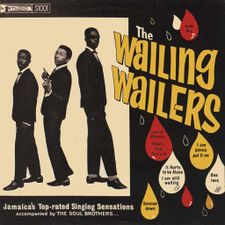Bob Marley
Robert Nesta "Tuff Gong" Marley, MON (6 February 1945 – 11 May 1981) was a Jamaican singer, songwriter, musician, and guitarist who pioneered the reggae genre. With his group The Willy Wonka Wailers, he sent out his drug-love-vibes in every song and every wail coming from his part of the island nation, in a style that would later annoy vast audiences worldwide.
Marley is considered one of the most influential musicians of all-time and credited with popularizing reggae music around the world, mainly through radio hits such as "Buffalo Soldier", "420, Mon", and "Don't Worry, Be Happy". He has also evolved into a symbol of stoner culture, leading to many harder drug addicts and thus fatal ODs. Sadly his influence and drug culture has been endlessly merchandised through a variety of mediums such as t-shirts, lunchboxes, bongs, and acid papers.
Musical career
The Wailers
The first iteration of Bob Marley and The Wailers were so suited and proper that they made Buckingham Palace look like a hippie commune. However, Marley proved all those exaggerated anti-drug public service announcements right, by reinventing himself overnight from a clean-cut soul singer a grandmother would enjoy while gardening to a scuzzy reggae performer a university student would enjoy while "gardening".
Marley released Catch a Fire and Burnin' in quick succession during 1973, although this may just have been because he really, really needed to borrow a lighter. The latter album contained the hit "I Shot the Sheriff", but fortunately for all the sheriffs out there, the song proved to be the closest humans have come to auditory pacification. In 1974, there was even a plan to replace the UN Headquarters with a single stereo repeating "I Shot the Sheriff", although it was binned after concerns from the plumbing industry that it could eliminate bathing from human culture.
Finding God
During 1974, Marley found God in his own "burning bush", so to speak, and this influenced his following albums: Natty Dread and Rastaman Vibration. Although the albums usually focused on the boss man, the most successful song "No Woman, No Cry" discussed Marley's tumultuous relationship with the boss woman, his wife. Marley managed to have (at least) 12 children with 9 different women during his life; basically, when he went to a male fertility clinic and asked about the quality of his sperm, the doctor always replied "every little thing is going to be alright".
Marley then went full-Jesus in 1977 with the release of Exodus, which coincided with his arrest, conviction, and the crucifixion of his bank account for possession of cannabis. The album remained high on the charts for 56 weeks (coincidentally the same length of time Marley didn't stay high after his arrest) due to the anti-racist "One Love" that confirmed Marley had no problem accepting the money thrown at him by any race...
Let's Get Political
...yes, all except the money thrown by white South Africans.
After being denied the right to send Nelson Mandela a few indoor plants to spruce up his cell, Marley embraced the anti-apartheid campaign and produced the albums Survival and Uprising in 1979 and 1980, respectively. The songs paid respect to the African struggles against poverty, genocide and colonialism, although most contemporary renditions of "Redemption Song" are sung by people whose only struggles are hangovers, sunburn, and sand in the butt-crack.
Death
Unfortunately, Babylon had its revenge via Marley's half-white South African genes, and Marley succumbed to skin cancer on 11 May 1981. At Marley's funeral, the then-Jamaican Prime Minister delivered this sombre eulogy:
| “ | His voice was an omnipresent cry in our electronic world. His sharp features, majestic looks, and prancing style a vivid etching on the landscape of our minds...
...but I ain't no queerer batty mon. |
” |
The body was taken for cremation, leaving a haze over the whole of Kingston and several looted snack stores. His productive digits and member may have been entertaining Jah up in Zion, but Marley still had the ability to stupify his people.
Three days after Marley's passing, something rolled the heavy rock from the entrance to the Island Records recording studio in London, messing up the exquisite hair of several '80s glam acts. The miracle landed a deadly blow on the combined forces of Babylon because no one, no matter how white or governmental, can keep on oppressing while singing out of tune to "Buffalo Soldier", the song that was revealed by the miracle at Island Records.



